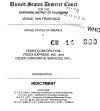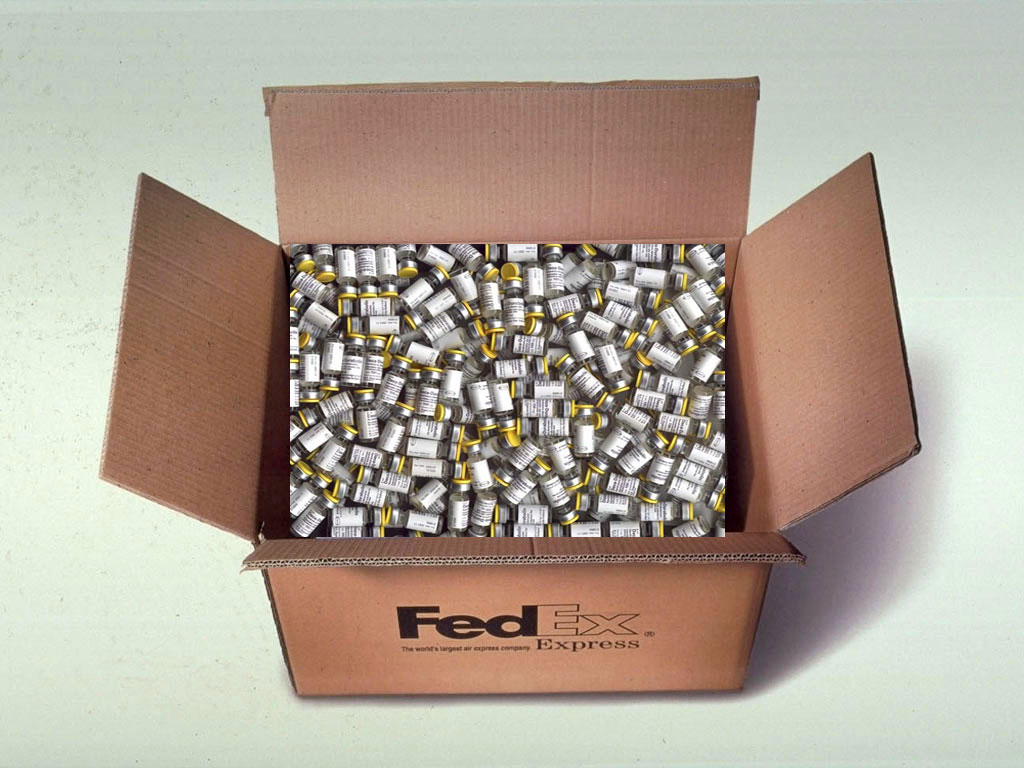2014: The feds indicted Fedex on conspiracy charges related to the distribution of controlled substances:

July 18, 2014
Contact: Casey Rettig
Phone Number: (415) 436-7994
For Immediate Release
FedEx Indicted For Its Role In Distributing Controlled Substances And Prescription Drugs
SAN FRANCISCO - A federal grand jury in San Francisco indicted FedEx Corporation, FedEx Express, Inc., and FedEx Corporate Services, Inc., today, with conspiracies to traffic in controlled substances and misbranded prescription drugs for its role in distributing controlled substances and prescription drugs for illegal Internet pharmacies, announced United States Attorney Melinda Haag, Drug Enforcement (DEA) Special Agent in Charge Jay Fitzpatrick, and Food and Drug (FDA) Acting Director of the Office of Criminal Investigations Philip J. Walsky.
According to the indictment, beginning in approximately 1998, Internet pharmacies began offering consumers prescription drugs, including controlled substances, based on the provision of information over the Internet. While some Internet pharmacies were managed by well-known pharmacy chains that required valid prescriptions and visits to the patient’s personal physician, others failed to require a prescription before filling orders for controlled substances and prescription drugs. These Internet pharmacies filled orders based solely on the completion of an online questionnaire, without a physical examination, diagnosis, or face-to-face meeting with a physician. Such practices violated federal and state laws governing the distribution of prescription drugs and controlled substances.
According to the indictment, from at least as early as 2004, DEA, FDA and members of Congress and their staff informed FedEx that illegal Internet pharmacies were using its shipping services to distribute controlled substances and prescription drugs in violation of the Controlled Substances (CSA), Food, Drug and Cosmetic (FDCA), and numerous state laws. In 2004, FedEx established an Online Pharmacy Credit Policy requiring that all online pharmacy shippers be approved by the Credit Department prior to opening a new account. The stated reason for this policy was that many Internet pharmacies operated outside federal and state regulations over the sale of controlled drugs and many sites had been shut down by the government without warning, leaving a large balance owed to FedEx. According to the indictment, FedEx also established a Sales policy in which all online pharmacies were assigned to a “catchall” classification to protect the commission-based compensation of its sales professionals from the volatility caused by online pharmacies moving shipping locations often to avoid detection by the DEA.
According to the indictment, as early as 2004, FedEx knew that it was delivering drugs to dealers and addicts. FedEx’s couriers in Kentucky, Tennessee, and Virginia expressed safety concerns that were circulated to FedEx Senior management, including that FedEx trucks were stopped on the road by online pharmacy customers demanding packages of pills; that the delivery address was a parking lot, school, or vacant home where several car loads of people were waiting for the FedEx driver to arrive with their drugs; that customers were jumping on the FedEx trucks and demanding online pharmacy packages; and that FedEx drivers were threatened if they insisted on delivering packages to the addresses instead of giving the packages to customers who demanded them. In response to these concerns, FedEx adopted a procedure whereby Internet pharmacy packages from problematic shippers were held for pick up at specific stations, rather than delivered to the recipient’s address.
FedEx is charged in the indictment with conspiring with two separate but related Internet pharmacy organizations: the Chhabra-Smoley Organization, from 2000 through 2008, and Superior Drugs, from 2002 through 2010. In each case, FedEx is alleged to have knowingly and intentionally conspired to distribute controlled substances and prescription drugs, including (Schedule III); Ambien, Phentermine, Diazepam, and (Schedule IV), to customers who had no legitimate medical need for them based on invalid prescriptions issued by doctors who were acting outside the usual course of professional practice. The indictment charges that FedEx conspired with these organizations to violate the CSA, 21 U.S.C. §§ 841, 846, and the FDCA, 21 U.S.C. §§ 331,
et seq.
According to the indictment, FedEx began delivering controlled substances and prescription drugs for Internet pharmacies run by Vincent Chhabra, including RxNetwork and USA Prescription, in 2000. When Chhabra was arrested in December of 2003 for illegally distributing controlled substances based on a doctor’s review of an on-line questionnaire, Robert Smoley took over the organization and continued the illegal distribution of controlled substances and prescription drugs through FedEx.
According to the indictment, FedEx began delivering controlled substances and prescription drugs for Superior Drugs in 2002. FedEx’s employees knew that Superior Drugs filled orders for online pharmacies that sold controlled substances and prescription drugs to consumers without the need for a face-to-face meeting with, or physical examination or laboratory tests by, a physician.
According to the indictment, FedEx’s employees knew that online pharmacies and fulfillment pharmacies affiliated with both the Chhabra-Smoley organization and Superior Drugs were closed down by state and federal law enforcement agencies and that their owners, operators, pharmacists, and doctors were indicted, arrested and convicted of illegally distributing drugs. Nevertheless, FedEx continued to deliver controlled substances and prescription drugs for the Chhabra-Smoley organization and Superior Drugs.
“The advent of Internet pharmacies allowed the cheap and easy distribution of massive amounts of illegal prescription drugs to every corner of the United States, while allowing perpetrators to conceal their identities through the anonymity the Internet provides,” said U.S. Attorney Melinda Haag. “This indictment highlights the importance of holding corporations that knowingly enable illegal activity responsible for their role in aiding criminal behavior.”
“Pharmaceutical drug abuse is a serious problem affecting millions of consumers in the United States,” said DEA Special Agent in Charge Jay Fitzpatrick. “While DEA is committed to ensuring patients receive legitimate prescriptions, today’s action should send a strong message that corporations that participate in illegal activity risk investigation and prosecution.”
“Illegal Internet pharmacies rely on illicit Internet shipping and distribution practices. Without intermediaries, the online pharmacies that sell counterfeit and other illegal drugs are limited in the harm they can do to consumers,” said Philip J. Walsky, Acting Director, FDA’s Office of Criminal Investigations. “The FDA is hopeful that today’s action will continue to reinforce the message that the public’s health takes priority over a company’s profits.”
FedEx has been summoned to appear in federal court in San Francisco on July 29, 2014.
An indictment merely alleges that crimes have been committed, and all defendants are presumed innocent unless and until proven guilty beyond a reasonable doubt. If convicted, the defendants face a maximum sentence of five years of probation, and a fine of between $1 and 2.5 million, or twice the gross gain derived from the offense, alleged in the indictment to be at least $820 million. The defendants are also liable for restitution to victims of the crime, as well as forfeiture of the gross proceeds of the offense and any facilitating property. However, any sentence following conviction would be imposed by the court only after consideration of the U.S. Sentencing Guidelines and the federal statute governing the imposition of a sentence, 18 U.S.C. § 3553.
Kirstin M. Ault and Kyle F. Waldinger are the Assistant U.S. Attorneys who are prosecuting the case with the assistance of Maryam Beros and Rawaty Yim. The prosecution is the result of a nine year investigation by the DEA and FDA, Office of Criminal Investigations.
Source:
https://www.dea.gov/press-releases/...s-role-distributing-controlled-substances-and

 thinksteroids.com
thinksteroids.com

 thinksteroids.com
thinksteroids.com





